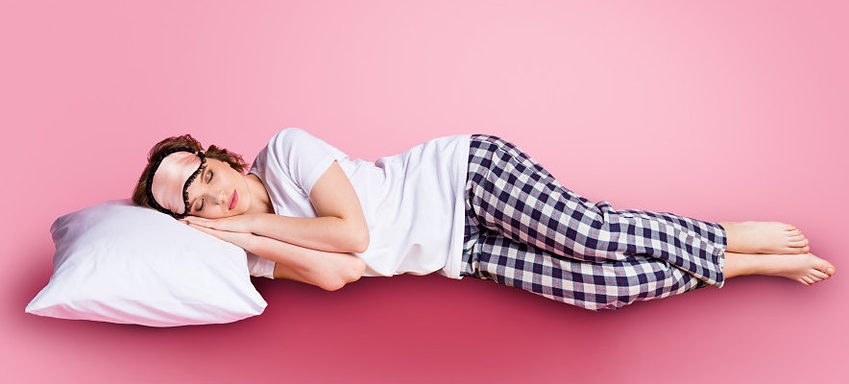The top reasons for sleeping with your hands under your head are comfort, warmth and a feeling of protection. Your arms and hands feel soft and warm. When we first came down out of the trees it was better than sleeping with our faces in the dirt. It’s been handed down to us since we slept on the ground. But, it may be that you just feel like sleeping that way.
Table of Contents
I like sleeping with my hands under my Face
I sleep with my hands under my head at night because it cradles my face just above the pillow and helps keep me in a position where I feel comfortable.
With my face elevated just above the pillow by my hand I can breathe easier because I can get better fresh air flow.
Sometimes I will even turn my head to face slightly upward to really open my airways while my hand keeps my neck aligned with my spine.
Another reason I sleep with my hand under my head is because I have tinnitus. I can hear sounds around me with my head elevated sightly by my hand.
When one ear is blocked by sleeping with my ear pressed into a pillow or the bed it blocks external sounds and I hear more of the internal sounds caused by tinnitus.
I also feel more secure if I can hear if a strange sound at night that triggers an alert response. I think this is a good reason our ancestors slept this way to be alerted to dangers at night.
I don’t like my face pushed down into the bed or the pillow but I like sleeping on my side and stomach at times and I change positions a lot at night. So my hand is just the right size in the right place when I need it.
When did we begin sleeping with hands under our heads?
There is some study suggesting that our sleep positions in many ways are instinctive and are inherent from the times we just laid on the ground.
Different cultures in the past adapted sleep positions to deal with certain environmental conditions.
One example taught by tribal people in Kenya was to sleep on your side using your arm as a pillow so you could listen for danger while you slept.
You also may have placed your hands under your head to keep your face away from the ground where there could be creep crawlies moving around while you were sleeping.
Some problems from sleeping on your hands
If you have nerve, circulation or arthritis issues with your hands or arms you may be affected by the compression or tensions created when sleeping with your hands under your head.
People with nerve conditions such as carpal tunnel syndrome, cubital tunnel syndrome or nerve damage from other issues may be especially sensitive.
You could experience pain, tingling, numbness or swelling known as paresthesia. This can be due to being in one position with pressure on a nerve for a period of time and be temporary.
Your hand can also go to sleep from cutting off circulation because of your sleeping position. When you move your hand and relieve the pressure it wakes back up again.
Another thing that can arise by sleeping with your lower hand cradled under your head is compression of your shoulder joint.
Combined with poor posture practices that many people experience such as sitting with our shoulders rounded forward during the day it could contribute to impingement (pinched tendons around the rotator cuff).
Where should your hands go when you sleep?
I have nerve damage from an old surgery. Sometimes a few moments of compression can help me with the needles and tightness I feel in my hand, but I can wake up with my hands asleep if I lay that way too long.
So, if you are a side sleeper like I am and need to keep your hands out, use your pillow to keep your neck aligned with your spine, not too low or too high.
Keep your lower shoulder flat on the bed with your lower arm extended out at about 90 degrees from your side and your upper arm resting on your pillow.
Eliminate pressure on your hips, back and knees by placing a pillow between your legs. Keeping your spine aligned and reducing points of pressure are important to sleeping comfortably and not creating a new problem.
Important takeaways
So while many of us like to sleep with our hands under our face, for some people it can aggravate problems that we experience with nerves, muscles, circulation or arthritis.
Changing your sleep position a little can help improve your hand comfort and still sleep well.
Remember to always keep your neck and spine aligned to avoid any stress, compression or pinching.
Our habit of sleeping this way instinctively passed down just feels right. Maybe we were born that way.
Where do you put your hands when you sleep?
Leave your answer in the comments below.
Goodnight!

The information on this website is for educational and informational purposes only and is not intended to be a substitute for professional medical advice, diagnosis, or treatment. When you have questions regarding your health you should seek the advice of your health care provider.
references
Hands or feet asleep? what to do.
https://www.health.harvard.edu/blog/hands-or-feet-asleep-what-to-do-2020022118924
Instinctive sleeping and resting postures: an anthropological and zoological approach to treatment of low back and joint pain
https://www.ncbi.nlm.nih.gov/pmc/articles/PMC1119282/
your sleeping positions are making you tight and sore
https://druidhillspt.com/uncategorized/your-sleeping-positions-are-making-you-tight-and-sore/
Related links
Why do I constantly change positions while I sleep?

Can you pull a muscle in your sleep at night?


